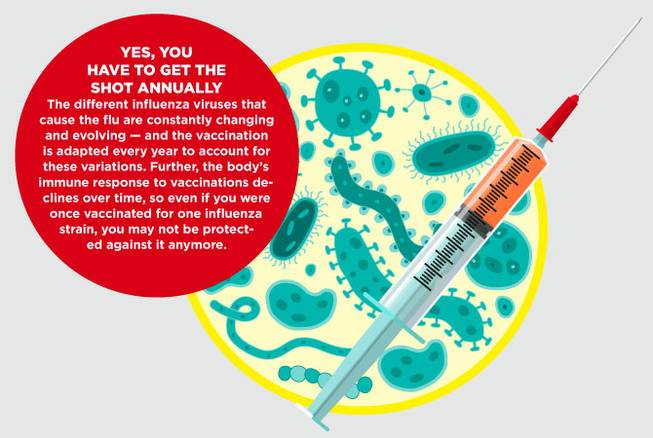
Monday, Aug. 28, 2017 | 2 a.m.
There are many myths about the flu vaccine, such as the idea that you don’t need to worry about it until wintertime.
In reality, “flu season” varies from year to year, and the Centers for Disease Control and Prevention recommends getting vaccinated as soon as the shot is available, which is usually by late August or early September. Those who wait remain unprotected against the flu for weeks or even months.
Additionally, there are other myths and common misunderstandings about the flu shot that may discourage people from receiving this important vaccination.
Why get it early
Flu season usually begins by October and peaks around January, but it can begin much sooner depending on the specific viral strain. Because of this unpredictability, it’s important to get the shot sooner rather than later.
Once you receive the shot, it takes about two weeks to become effective and will probably remain so for about a year.
“Typically, the vaccine will last throughout the entire flu season, but there are some factors — including age, predominant viral strain that season and the base health status of the individual — that can affect the duration of the vaccine,” said Collin Johnston, DO, Nevada Medical Director of CareNow Urgent Care, part of the Sunrise Health System.
Who should get the vaccine?
Pretty much everyone. “In years past, a focus was placed on those with weakened immune systems, young children and the elderly to get the flu shot. But in recent years, the CDC has made an effort to encourage nearly everyone over the age of 6 months to be vaccinated annually,” Johnston said. “Any risks that have been reported are significantly outweighed by the benefits for both the individual and our community as a whole.”
If you have any questions or concerns about receiving the vaccination, talk to your doctor.
What’s in the flu vaccine?
There are four main types of influenza viruses: A, B, C and D.
The 2017-18 flu vaccine will contain three or four different strains of the virus:
• A/Michigan/45/2015(H1N1)pdm09-like virus
• A/Hong Kong/4801/2014(H3N2)-like virus
• B/Brisbane/60/2008-like (B/Victoria lineage) virus
• B/Phuket/3073/2013-like (B/Yamagata lineage) virus
The first component is the virus type — in this case, A or B.
The second component is the geographical origin.
The third is the strain number.
The fourth is the year of isolation (if in the 2000s, it’s four digits; if in the 1900s, it’s referred to as only the last two digits).
The next is the protein description (only for Type A strains).
Type B are designated by two lineages, either B/Yamagata or B/Victoria.
Strains and their impact
A, B and C can affect humans, though C generally presents as a mild illness and isn’t likely to cause an epidemic. A and B types can create similar illness symptoms, but A types are the only ones to have ever caused a worldwide pandemic.
Type D is not known to affect humans, but it is common in cattle.
Other ingredients
Vaccines also contain egg proteins, preservatives, stabilizers (to maintain potency), trace amounts of antibiotics (to prevent bacteria from contaminating the vaccine) and formaldehyde (to deactivate the toxins in the virus strains).
People with egg allergies should avoid the typical flu shot, but can talk to their doctor about alternatives that don’t include egg protein.
Formaldehyde is used in very small doses — less than what occurs naturally within your body — and is not dangerous at those levels.
Yes, you have to get the shot annually
The different influenza viruses that cause the flu are constantly changing and evolving — and the vaccination is adapted every year to account for these variations. Further, the body’s immune response to vaccinations declines over time, so even if you were once vaccinated for one influenza strain, you may not be protected against it anymore.
No, the vaccine doesn’t give you the flu
Some flu shots contain a deactivated virus, others do not contain a virus at all, and neither can give you the flu. “Study after study has proven that the flu shot does not cause the flu,” Johnston said.
Some people may react to the shot itself and experience soreness/redness at the injection site, as well as the possibility of a low-grade fever and/or headache. However, Johnston stresses that these reactions are extremely rare and do not last more than two days.
These side effects occur as a result of the immune system adjusting to the vaccine, not because of a flu infection.
It can protect your heart
A 2013 study published in the Journal of the American Medical Association found that getting a flu vaccination lowered a person’s chances of heart disease within that year by about 36 percent. This is attributed to reducing the inflammation that occurs as a result of the flu in vulnerable patients, such as the elderly and those with a compromised immune system.

Join the Discussion:
Check this out for a full explanation of our conversion to the LiveFyre commenting system and instructions on how to sign up for an account.
Full comments policy